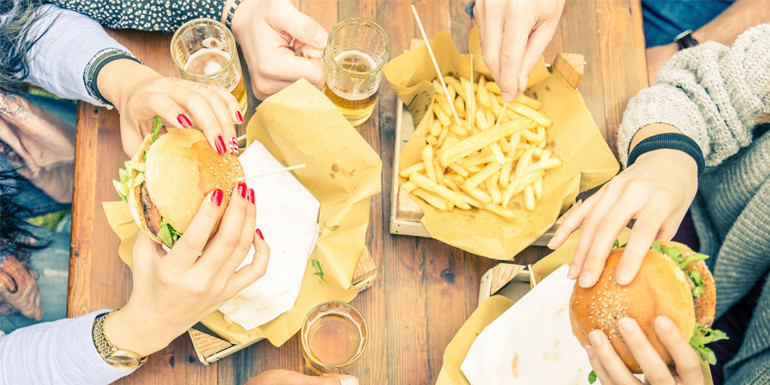
OK, they’re not trying to help you gain weight — but they might be anyway. No worries, though, you don’t have to give up your friends if you’re trying to lose weight. Just being aware of these 10 sly situations where your amigos may coax you into eating bigger portions or more junk (or spending more time sitting on your butt) can help you battle back.
They ask you if you’ve gained a few
Your pals are supposed to be supportive through the ups and downs of your weight. But the more critical they are of your body, the more weight you gain, suggests a recent study in the journal Personal Relationships. Tell any Negative Nancy’s in your family you just don’t want to hear it.
They don’t want to lose it with you
When the dieting road gets tough, having support from family and friends—and seeing them succeed—can help keep you motivated, suggests preliminary research from Harvard University. During the 10-month study, people who participated in weight-loss programs with others in their social networks shed six-and-a-half more pounds (and trimmed an additional quarter inch from their waists) than those who went at it alone. Grab a bud and tackle your goals together!
They order the nachos
Ever wonder why you and your friends seem to all be on the same page when it comes to what you want to order at the restaurant? Turns out, we tend to order similar food as our tablemates, suggests University of Illinois research. So when someone orders the burger and fries, it gives you the license to then order the wings. The trick? Be the first to order at the table (and go for the turkey chili instead).
They can’t resist a treat
What’s guaranteed to plummet your willpower? When your friends’ willpower falls. In a 2012 study in Appetite, researchers gave groups of women plates of cookies, and secretly asked their friends not to eat the cookies. When their friends didn’t touch the sweets, the women were less likely to indulge themselves. You know that friend who says she’s not a “sweets” person (and you totally are)? She’s someone who can help you avoid temptation, such as candy at the movie theater or dessert at the restaurant.
They’re overweight
Pals with unhealthy habits rub off on you. Students who had heavier friends were more likely to gain weight, found a study in PLOS ONE. That doesn’t mean you should ditch your group, but use it as a reason to make friends with someone you see at Spin class.
They’re doing cool stuff on Facebook
It’s a fact we only show our best selves on social media (the kind that takes exotic vacations, eats at hot new restaurants, and have spouses who like to clean). If you see your friends always looking happy, healthy, fit, and doing fabulous things, it might prompt you to question your life. So it’s no surprise that a 2013 study in the Journal of Consumer Research found that following your friends on Facebook can be correlated with a higher BMI, possibly because logging on can trigger emotional responses that could lower your self-control. See what your friends are up to — but keep the snacks at a safe distance.
They eat fast
It’s natural to do as your friends do, and the same goes for the speed at which they eat. If your friend shovels food in his mouth quickly, you’re more likely to do the same, suggests another study in PLOS One. Since the faster you eat, the more calories you consume, it pays to slow down.
They pressure you into the slice of cheesecake
Your coworker made the office cookies or your aunt made his famous chocolate cake—and they really want you to try some. If you’re a people-pleaser, you’re more likely to say yes, despite your dieting goals, suggests a study in the Journal of Social and Clinical Psychology. You can say a polite no thanks and survive, we promise.
They like couch time
If one friend wants to sit on the couch and binge watch Girls and another wants to play tennis, who do you think you should join to support your weight loss goals? A study in the Journal of Public Economics suggests that poor physical fitness is contagious among friends. Be the good influence and set up a walking date after work instead of a trip to the dessert bar.
They’re women
In a group meal setting, simply having women at the table can cause overeating, according to a study in the Journal of Applied Social Psychology. The researchers found that women tend to “purchase more calories” when dining in all-female groups, while men tend to do the same in mixed gender groups. So girls, don’t forget to invite the guys. And guys, don’t try to impress the ladies by treating dinner like an eating contest.

No comments:
Post a Comment